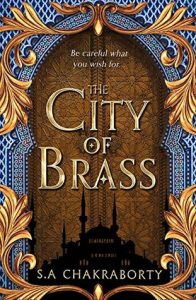The City of Brass by S.A. Chakraborty
 The City of Brass is 532 pages told in thirty number chapters with an epilogue. The story is told in the third person via Nahri and Ali.
The City of Brass is 532 pages told in thirty number chapters with an epilogue. The story is told in the third person via Nahri and Ali.
I need to admit something right away – I had a song from Aladdin playing in my head almost the entire time that I read this book. I partly blame myself for watching that movie about a million times as a child, and partly blame author S.A. Chakraborty for creating a character called Prince Ali (if you know the movie, you likely know which song). Admittedly, this book does share some characteristics with Disney’s classic, if heavily appropriated, tale of desire and consequence. The City of Brass is quite literally full of djinn, and while Robin Williams brilliant take on the wish-fulfilling magical being is unforgettable, Chakraborty creates characters every bit as memorable and a mythology that begs for more. The City of Brass does for Northern Africa and the Middle-East what The Bear and the Nightingale did for folkloric Russia, and it’s difficult not to compare Chakraborty with Katherine Arden, both in style and content.
We first meet Nahri as she swindles a pair of Ottomon Turks, which places The City of Brass squarely in the 19th century. France has recently taken over Cairo, and while the fluctuations of these wars of empire flow around the Egyptian city, Nahri is simply trying to survive. She does this partly through her power to heal, a secretive thing that she does not fully understand until she accidently summons an uber-powerful daeva named Darayavahoush e-Afhsin (and yes, there are some real mouthfuls in this book, enough to keep a Western man’s brain tongue-tied). Dara takes Nahri on a magic carpet ride, opening her up to a whole new world that she never knew. No joke. It actually happens, and while it sounds somewhat silly when I write it, the ride is one fraught with danger, and this new world that Nahri comes to is a frightening one she never asked for. Dara and Nahri are chased by a band of evil ifrit, and while I could explain what the various tribes of the djinn are and how they relate to one another, it is best left to the reader to uncover these delightful morsels. It does get confusing, and there were times when I wish Chakraborty would have given us a little more to work with, but by the end of the story, I could fire off any number of family histories and likely recite a holy prayer or two.
Our second narrator is Alizayd al Qahtani, a prince of Daevabad, the capital of the magical realm of the djinn. Hidden from human eyes, Daevabad becomes the axis around which the entire tale revolves, and Ali is our window into its mechanisms. Factions compete within Daevabad’s walls, and Ali finds himself torn apart by his differing loyalties. His anxiety only accumulates when he finally meets Nahri.
The City of Brass, at its core, is a story about an orphan rediscovering a life taken from her. This is not new territory, but setting that tale into an Arabian fantasy world both connected to our own and completely at odds with it is as new as this genre gets. There is something so rich about The City of Brass, like Middle Eastern food that is the very definition of savory, or a fine Persian rug that not only bedazzles the eye but tickles the foot in the most pleasant ways. I felt satisfied every time I put this book down, and hungry every time I turned the next page.
Is is all that I could have wished for? Almost. There are a hundred pages in the middle that truly drag, and I hope to see Chakraborty improve her pacing in the second installment. I also found the use of contemporary curse words to be a bit jarring. They are not used often, and when they are, they feel so completely out of place as to be laughable. One could also find some complaint in the actual form of the story. There are mysteries core to the book that are left largely unsolved, and while much is revealed to both Nahri and Ali, this book doesn’t have an ending in the traditional sense. It feels more like an episode of television that begs you to return next week. Thankfully, The City of Brass is good enough that many will be aching to revisit.
As far as debut fantasy novels go, this is one of the best I have read. That seemed to be a theme in 2017, with such immediate titans as Katherine Arden, Nicholas Eames, and Ed McDonald blazing their way into our magical minds. For someone who never intended to become a novelist, S.A. Chakraborty has landed herself among some august company.
